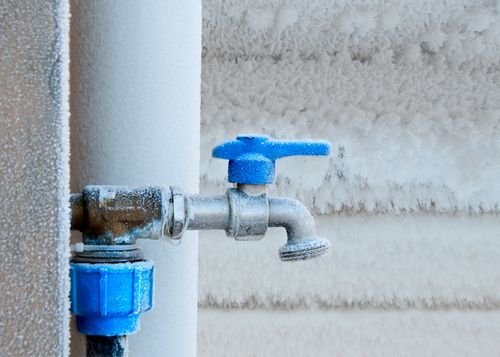Plumbers receive numerous emergency telephone calls for assistance during the winter because property owners don’t prepare for the coldest weather conditions. It is essential to plan for the deep freeze winter weather before it arrives to avoid problems such as bursting water pipes and leaking water heaters. If you have a major plumbing problem during an ice storm, then a plumber is frequently unable to respond because roads are closed, and you may not have toilets, sinks or bathtubs that will work. However, you can avoid many plumbing problems in the winter by preparing in the autumn. Here are some ways to protect a building’s pipes and plumbing fixtures from the damages of cold temperatures.
Insulate a Building’s Water Pipes
After draining the water from exterior water pipes, you can insulate the items with specialized tape that you wrap around the devices. Insulating tape is available in hardware stores, and you can also find other insulating devices such as foam covers that you can place over the faucets outside a building.
Paint Exterior Faucets and Pipes
It is difficult to see exterior faucets and pipes when there is snow on the ground, so as you are insulating the items, add a brightly colored paint to the metal. With this method, you can walk around the exterior of your business or home to inspect the plumbing fixtures to ensure that nothing has ruptured when it is cold outside.

Remove Sediments From a Building’s Water Heater
You might need more hot water in the winter, and a water heater must work harder to create hot water when it is cold. Inspect a water heater to make sure that it isn’t leaking moisture, and if it is, then you need to replace the appliance as soon as possible. When a water heater is in good condition, you should maintain it by emptying its tank to remove a buildup of sediments.
Keep Interior Pipes Warm In the Winter
The pipes inside a building can also rupture in the winter as the temperatures drop during the night. First, make sure to keep a building warm enough that water won’t freeze in the pipes. Next, walk through a building to open the cabinet doors underneath sinks so that climate-controlled air can circulate optimally. If your water heater is located in a cold garage or basement, then you may need to keep it warmer by heating the area with a space heater.
Take Care Of Your Kitchen’s Garbage Disposal
While you are cooking in the kitchen, make sure to take care of your kitchen’s garbage disposal by running hot water through the appliance each day. Grease and other food debris can freeze inside the pipes underneath the kitchen sink, leading to a plumbing disaster. In addition to running hot water down the drain, avoid placing items such as fibrous vegetables, pasta or eggshells in the garbage disposal.
Flush Toilets and Run Faucets To Keep Water From Freezing
If you want to keep water from freezing inside the pipes of a building, then make sure to flush the toilets and run the faucets occasionally. When it is cold, you might close off some of the rooms in a building, but these unheated areas are where water pipes might freeze in the walls or ceilings.
Charlie Teschner started MESA Plumbing, Heating, and Cooling in 1982. Charlie has a journeyman and master plumber’s license. He was raised with a strong work ethic and he now applies those values to tasks such as Longmont, CO heating repair.